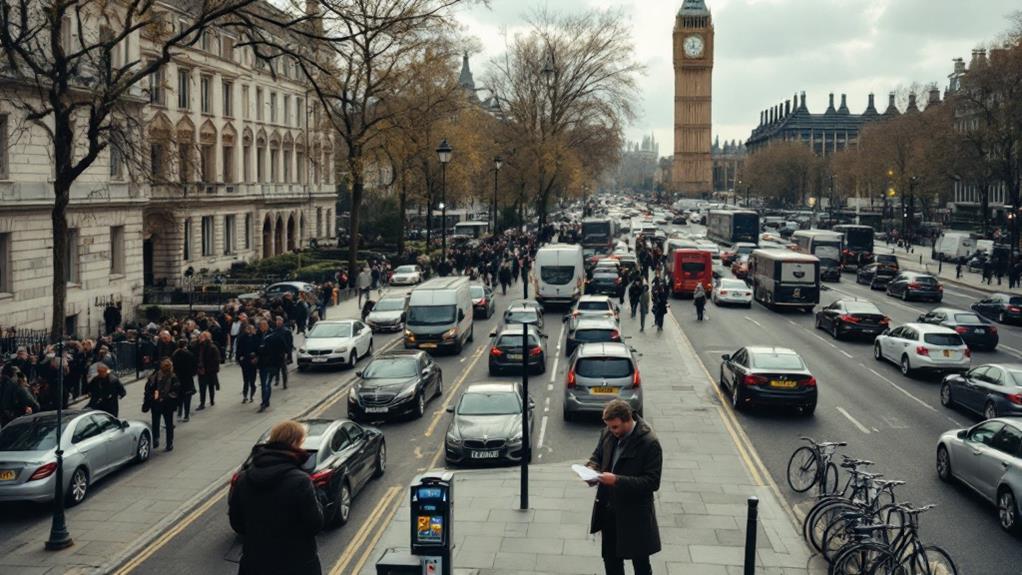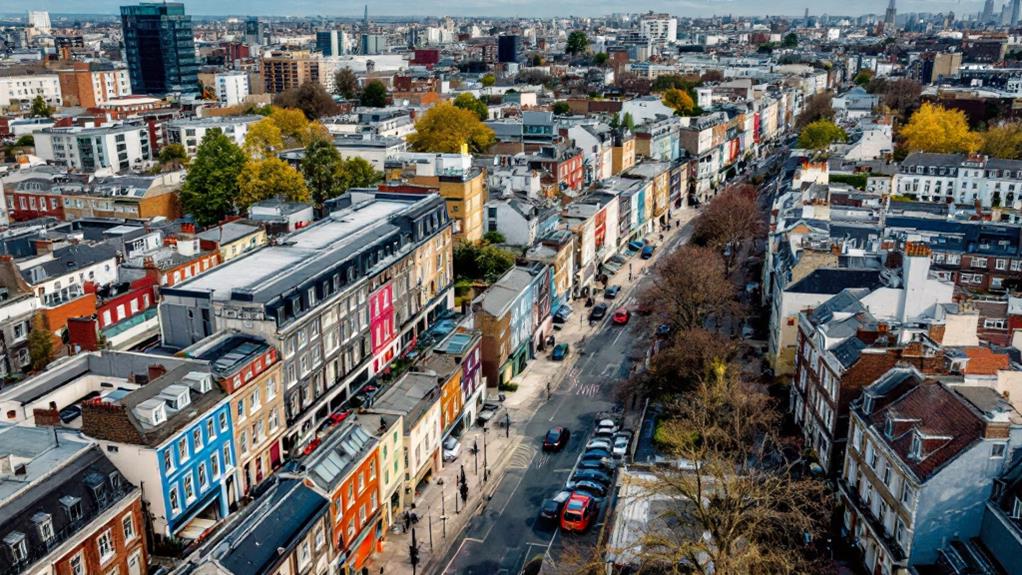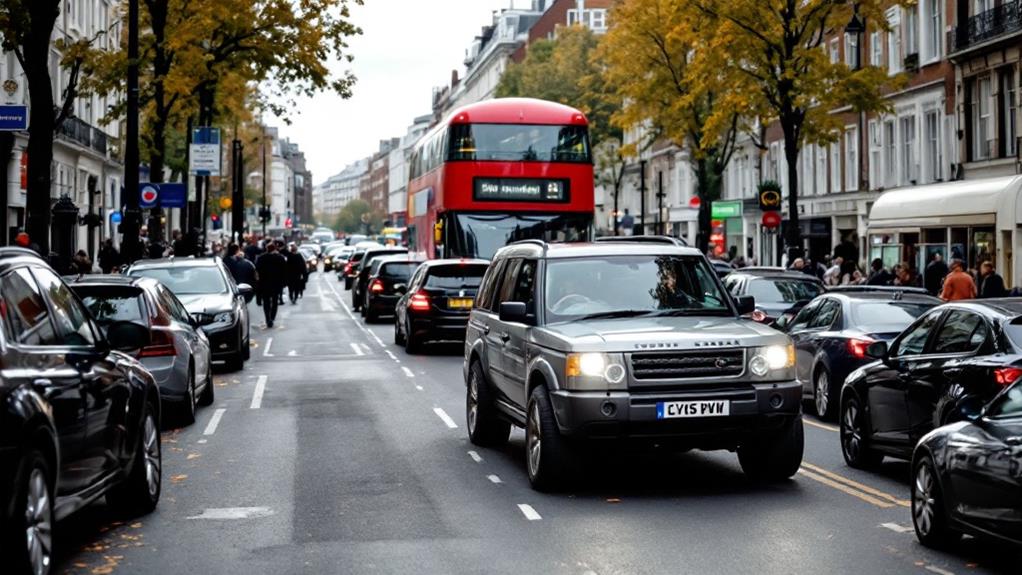How to Avoid Parking Fines and Tickets in London

To avoid parking fines in London, familiarize yourself with local regulations and signage. Employ pay-and-display machines correctly, or opt for mobile parking apps for convenience. Obtain necessary permits for residential zones and always check time limits. Be aware of restricted areas like single and double yellow lines, and don't park on pavements unless explicitly allowed. Leverage off-street parking alternatives when possible, and consider public transport options. If you do receive a ticket, review it carefully and appeal if you believe it's unfair. By staying informed and attentive, you'll considerably reduce your chances of costly penalties.
Understanding London's Parking Regulations
London's parking regulations can be complex and confusing, but understanding them is necessary to avoid hefty fines. You'll need to be particularly careful when parking your car on pavements, as it's illegal unless signs specifically allow it. Doing so can result in a £70 fixed penalty charge for obstructing pedestrian access.
When you encounter single yellow lines, pay close attention to nearby signs. These will indicate the specific times when parking is prohibited, which can vary by location. If you do receive a Penalty Charge Notice (PCN) for a parking violation, be aware that fines can range from £50 to £160. However, you can often reduce the fine by 50% if you pay within 14 days.
If you're a tradesperson working in London, you'll need to be extra vigilant. With an estimated 3.5 million parking fines issued to tradespeople annually, it's vital to familiarize yourself with the city's complex parking controls and permit requirements. To avoid unnecessary fines, always check for parking restrictions and make sure you have the appropriate permits before leaving your vehicle.
Identifying Restricted Parking Areas
Five key types of restricted parking areas in London demand your attention. First, be on the lookout for resident-only zones, which are strictly enforced and can result in hefty penalties if you park there without a permit. Second, pay close attention to single yellow lines near schools, bus stops, and taxi ranks. While you might think these areas are safe for parking, they often have specific loading restrictions that could catch you off guard.
Third, double yellow lines are a clear no-go zone. Parking on these is generally prohibited and will likely lead to a quick penalty. Fourth, keep an eye out for pay-and-display areas with strict time limits. Overstaying your welcome here can result in a ticket faster than you'd expect. Finally, be wary of temporary parking suspensions or road closures. These can pop up due to events or roadworks, catching unsuspecting drivers off guard.
To avoid getting caught out, always double-check the local parking signs and regulations before leaving your vehicle. Remember, restrictions can vary widely across London's boroughs, so don't assume what's true in one area applies everywhere. Stay vigilant, and you'll keep those parking fines off your back.
Proper Use of Pay-and-Display Machines
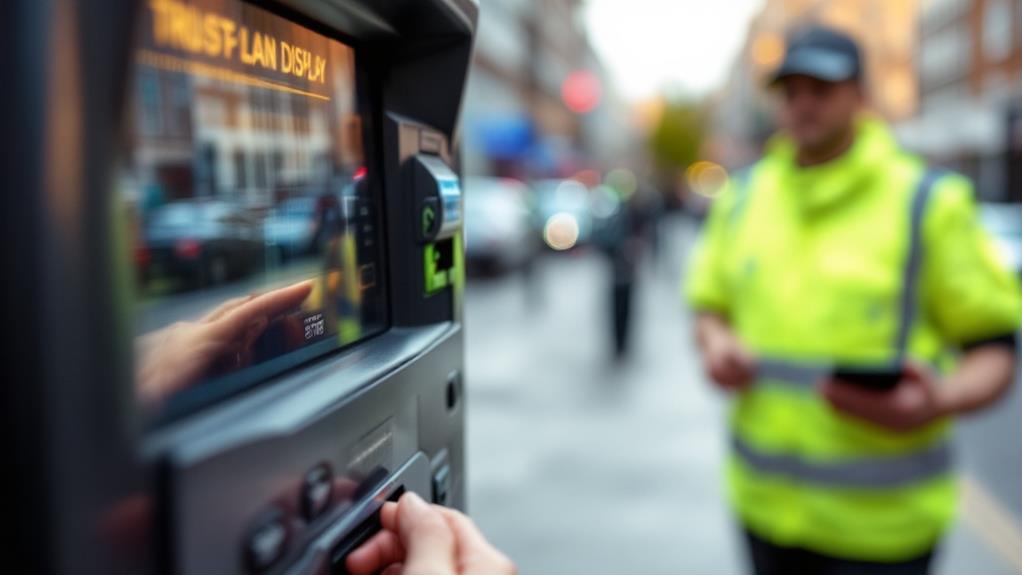
Pay-and-display machines can be your best friend or worst enemy when parking in London. To guarantee they work in your favor, always pay for parking, even if you're short on change. Most pay-and-display machines now accept card payments, making it easier to comply with parking regulations.
When using these machines, carefully enter your vehicle's registration details. Double-check for any mistakes, particularly between similar-looking letters and numbers. Once you've obtained your ticket, make it visible by clearly displaying it on your dashboard.
To avoid overstaying your welcome, set an alarm on your phone or use a parking app to track your remaining time. This simple step can save you from costly fines.
Be aware that grace periods and disabled parking rules may vary depending on your location. Always check the specific instructions on the pay-and-display machines or nearby signage.
Utilizing Mobile Parking Apps
Technology has revolutionized the way we park in London. Mobile parking apps have become an essential tool for drivers looking to avoid fines and tickets. These apps, such as RingGo, PayByPhone, and MiPermit, offer a range of features to make parking easier and more convenient.
When you use a mobile parking app, you'll benefit from:
- Remote payment and extension of parking sessions
- Timely alerts when your parking time is about to expire
- Automatic start and stop of parking sessions (for integrated vehicles)
You can say goodbye to fumbling for change or rushing back to your car to top up the meter. With these apps, you'll have the ability to pay for parking using your smartphone, giving you more flexibility and peace of mind. Plus, you'll have a digital record of all your parking payments, which can be priceless if you ever need to dispute a ticket.
Obtaining Necessary Parking Permits
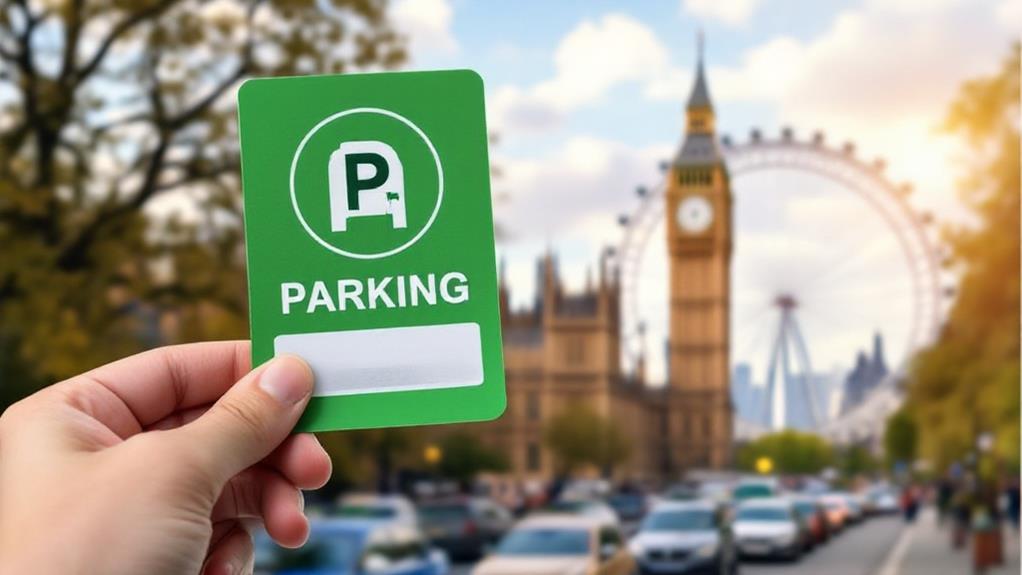
London's complex parking regulations can be traversed more easily by obtaining the necessary parking permits. Start by identifying the types of permits available in your area, such as resident permits, visitor permits, or business permits. Each type serves a specific purpose and can help you avoid costly fines.
To secure a resident permit, you'll need to comply with the application requirements and meet the specified deadlines. These permits are ideal for long-term parking needs and can greatly reduce your parking expenses. Don't forget to renew your permit on time to maintain continuous coverage and avoid potential penalties.
For occasional guests or short-term parking needs, consider utilizing visitor permits. These temporary options provide flexibility when accommodating friends, family, or service providers at your residence.
When applying for permits, gather all necessary documentation and submit your application well in advance. This proactive approach guarantees you'll have the proper permits in hand before you need them. By obtaining the right parking permits, you'll navigate London's parking landscape with greater ease and confidence, minimizing the risk of fines and tickets.
Avoiding Common Parking Mistakes
Where do most drivers go wrong when parking in London? Often, it's by overlooking important details or misunderstanding local regulations. To avoid these pitfalls and steer clear of a dreaded penalty charge notice, you'll need to be vigilant and informed.
First, always check the signage carefully. Each borough may have different rules, so don't assume what's true in one area applies everywhere. Pay attention to time limits and restrictions, especially in council car parks. Use mobile apps to track your parking duration and receive alerts when your time's nearly up.
- Overstaying your welcome: Even a few minutes can result in a fine.
- Misreading signs: Double-check for any conflicting information.
- Ignoring resident-only zones: These areas require specific permits.
If you're staying longer, consider obtaining the proper permits or passes for the area. This can save you from unexpected fines and provide peace of mind. Remember, if you do receive a ticket you believe is invalid, don't hesitate to challenge it through the appeals process. By staying informed and attentive, you'll greatly reduce your chances of facing parking fines in London.
Navigating Residential Parking Zones
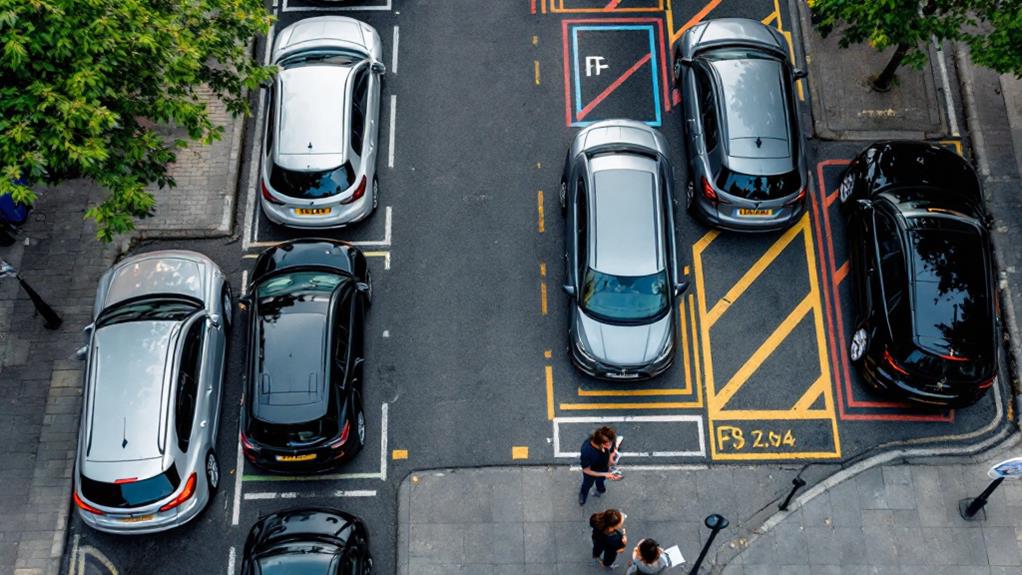
Throughout London's residential areas, traversing parking zones can be a challenging undertaking. To avoid a parking ticket, you must display a valid permit or visitor's pass when parking in these zones. As a resident, you can apply for an annual parking permit, granting you access to designated bays within your zone. If you're expecting guests, make sure to provide them with a visitor's pass, which allows temporary parking for a limited time.
Be aware that parking enforcement officers regularly patrol residential zones, issuing Penalty Charge Notices (PCNs) to vehicles without proper permits. Don't assume you're safe from fines just because you're parked in your usual spot – failing to renew your permit on time can still result in a charge.
To steer clear of unnecessary fines, always double-check that your permit is up to date and properly displayed. If you're visiting a residential area, look for signs indicating parking restrictions and confirm you have the appropriate pass. By staying vigilant and following these guidelines, you'll greatly reduce your chances of receiving a parking ticket in London's residential zones.
Time Management for Short-Term Parking
For short-term parking in London, managing your time effectively is essential to avoid fines. Be mindful of the time limits in your chosen parking spot and set alerts on your phone to notify you when it's time to get back to your vehicle. Take advantage of mobile apps that allow you to extend your parking duration remotely if you're running late. This flexibility can be a lifesaver when unexpected delays occur.
Remember that there's a 10-minute grace period before a Penalty Charge Notice is issued, but don't rely on this as a regular strategy. Instead, familiarize yourself with the specific parking restrictions in the area you're visiting to avoid common mistakes. Consider using mobile payment options to guarantee accurate and timely payment for your parking.
To make your short-term parking experience smoother:
- Scout the area for available spots before committing to a location
- Keep spare change handy for traditional parking meters
- Take a photo of your parking spot and nearby signs as a reference
Alternatives to Street Parking

Many alternatives to street parking can substantially reduce your risk of getting parking fines in London. One of the most effective options is to leverage off-street parking facilities like garages, car parks, or designated parking lots. These locations often have more flexible rules and fewer restrictions compared to on-street parking, making them a safer choice for avoiding tickets.
You can also investigate private parking apps and services that allow you to reserve and pay for parking spaces in advance. This guarantees you'll have a guaranteed spot without worrying about time limits or unexpected restrictions. If you're a resident in a controlled parking zone, look into obtaining a residential parking permit, which can provide you with designated spaces and exemptions from certain time restrictions.
For those willing to combine transportation methods, consider park-and-ride schemes. You can park your vehicle at the outskirts of the city and use public transport to reach your final destination. Speaking of public transport, using buses, trains, or the London Underground is an excellent way to avoid parking concerns altogether. By opting for these alternatives, you'll drastically reduce your chances of receiving parking fines in London.
Appealing Unfair Parking Tickets
Despite your best efforts, you may still find yourself on the receiving end of an unfair parking ticket in London. When faced with penalty notices, it's essential to know how to appeal a parking fine effectively. Start by carefully reviewing the ticket details for any discrepancies or errors that could support your case. Gather supporting evidence, such as receipts or photographs, to strengthen your argument during the appeals process.
Understand London's specific appeals procedure and adhere to all deadlines to guarantee your dispute is considered. When filing your appeal, provide a clear and concise explanation for why the parking ticket should be dismissed or reduced. If the initial decision is unfavorable, don't hesitate to persist with your appeal, as higher-level reviews may overturn the original ruling.
To improve your chances of a successful appeal:
- Document the scene with photos, including any relevant signage or road markings
- Obtain witness statements if applicable
- Research similar successful appeals for guidance
